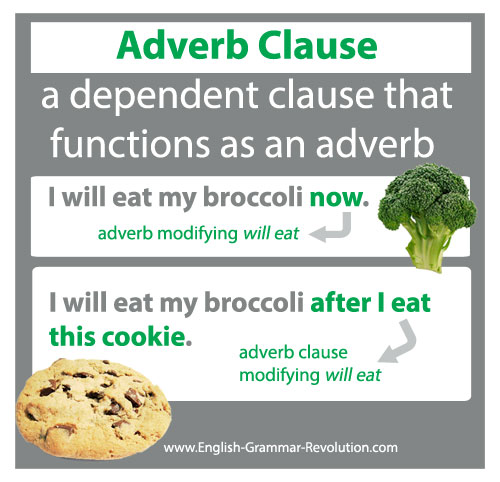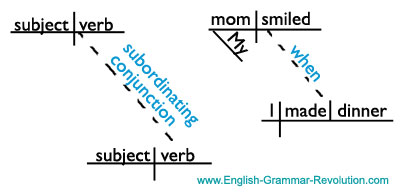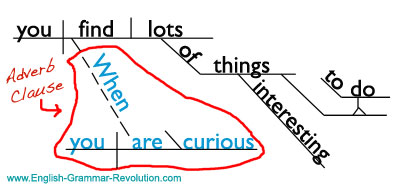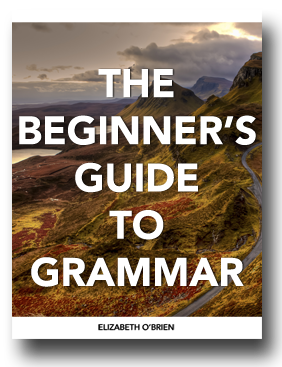📘 Download your free grammar guide here. 📘
📘 Download your free grammar guide here. 📘
What are adverb clauses?
What are adverb clauses?
Adverb clauses are subordinate clauses that act as ... adverbs! The whole clause does the job of an adverb.

Quick Refresher
Adverbs modify verbs, adjectives, and other adverbs.
Clauses are groups of words with a subject and a verb.
Subordinate clauses cannot stand alone.
Will you allow me to show you how a whole clause acts as an adverb? Great. I thought you would. Here we go.
I walked today.
Today is an adverb modifying the verb walked.
It is telling us when I walked. When did I walk? I walked today.
Now look at this next sentence.
I walked before the sun went down.
This time, a whole clause is modifying the verb walked! Isn't that exciting?
The clause is still telling us when I walked.
When did I walk? I walked before the sun went down.
This clause is an adverbial clause. It is a group of words with a subject and a verb, and it is acting as one part of speech, an adverb.
Subordinating Conjunctions
Adverbial clauses are introduced by special words called subordinating conjunctions. Subordinating conjunctions link adverb clauses with the word in the independent clause that the adverb clause is modifying.
Um, did I lose you there? That sounded really complex. I'm sorry about that. Let's look at another example.
My mom smiled when I made dinner.
The independent clause is My mom smiled. The adverbial clause is when I made dinner.
When is a subordinating conjunction introducing the adverbial clause. It's linking the word smiled from the independent clause with the whole dependent adverbial clause.
Do you know what would make this even easier? Let's look at a sentence diagram so that you can really SEE what I'm talking about.
In the following sentence diagram, you can see that the dependent adverbial clause (when I made dinner) is modifying the verb of the independent clause (smiled).
You can also see that when is the subordinating conjunction. It is diagrammed on a slanted, dotted line from the independent clause to the dependent clause.

What do you think?
Other subordinating conjunctions include after, because, if, whenever, until and many more.
You can see a more complete list of subordinating conjunctions here.
You can practice what you've learned with these exercises on subordinating conjunctions and adverb clauses!
Adverb Clauses Can't Stand Alone ... Poor Things!
Remember how I said that adverb clauses are a type of subordinate clause and subordinate clauses can't stand alone?
Let me show you what I mean.
Here are some examples of adverbial clauses.
until I fall asleep
whenever my teacher yells
after I walk the dog
All of those groups of words are clauses. They each have a subject and a verb.
But, none of them express a complete thought. In each of those examples, we are left wondering what is going on.
Now, if we attach an independent clause before or after the adverb clause, we'll have a complete sentence that makes sense.
I listen to music until I fall asleep.
Whenever my teacher yells, I know she's having a bad day.
I will take out the trash after I walk the dog.
Adverbial clauses need to be attached to independent clauses in order to make a complete sentence.
The Adverb Questions
Adverbial clauses answer the adverb questions. That means that the whole clause tells us these things ...
- How? I walk faster than David walks.
- When? I walk before the sun goes down.
- Where? I walk wherever the trail is paved.
- Why? I walk because it makes me feel good.
- To what extent? I walk more now than I walked one month ago.
- Under what condition? I walk if it's not raining.
Here's one more example diagram for you. It's a little complex, but I thought you might like to see it anyway!
When you are curious, you find lots of interesting things to do.
Can you identify the independent clause? How about the adverbial dependent clause and the subordinating conjunction?
If you'd like to teach or learn grammar the easy way—with sentence diagrams—check out our Get Smart Grammar Program.
It starts from the very beginning and teaches you grammar and sentence diagramming in easy, bite-size lessons.

Hello! I'm Elizabeth O'Brien, and my goal is to get you jazzed about grammar.
We used your sentence diagramming program last year, and my son LOVED it!
- Gretchen, Homeschooler
This is original content from https://www.english-grammar-revolution.com/adverb-clauses.html
Our Free Guide Gives You A Fun Way
To Teach And Learn The Basics v

Elizabeth O'Brien is the creator of Grammar Revolution.
Her lessons are guaranteed to give you more confidence in your communication skills and make you smile. :)

